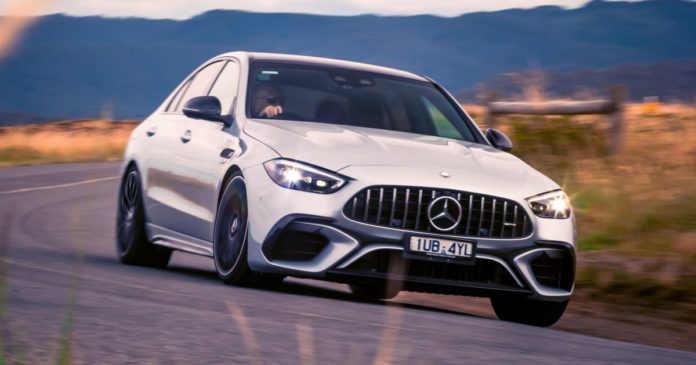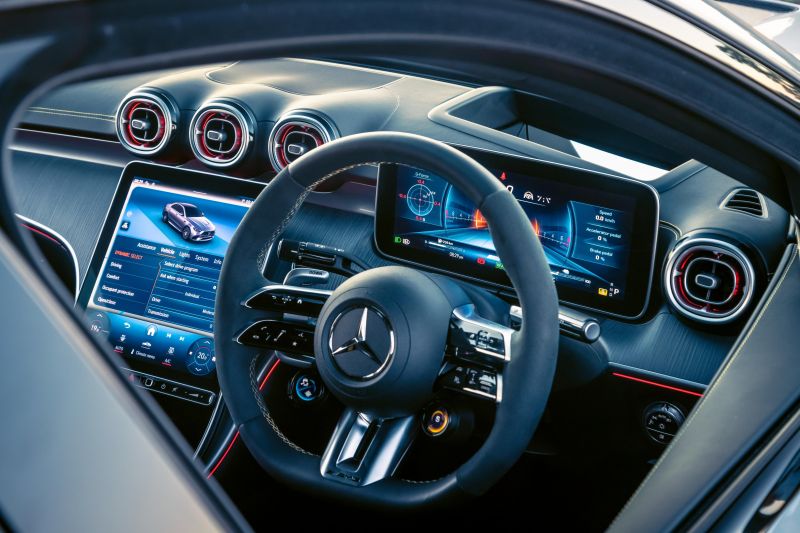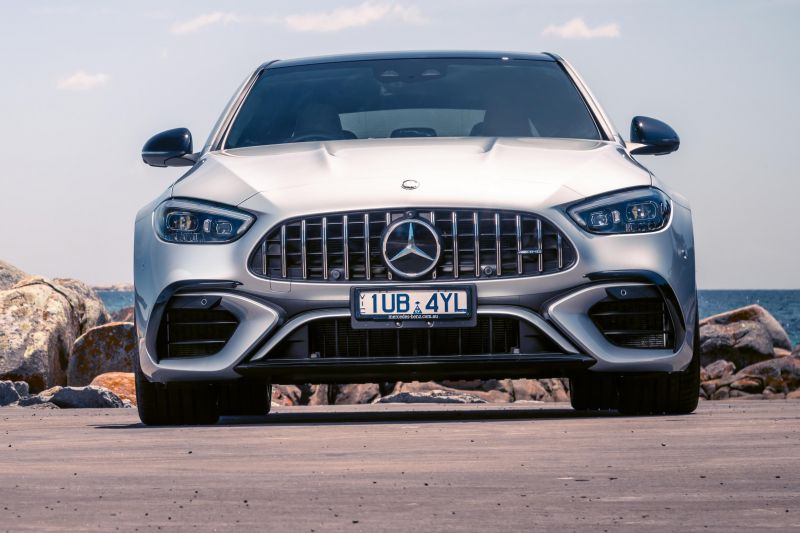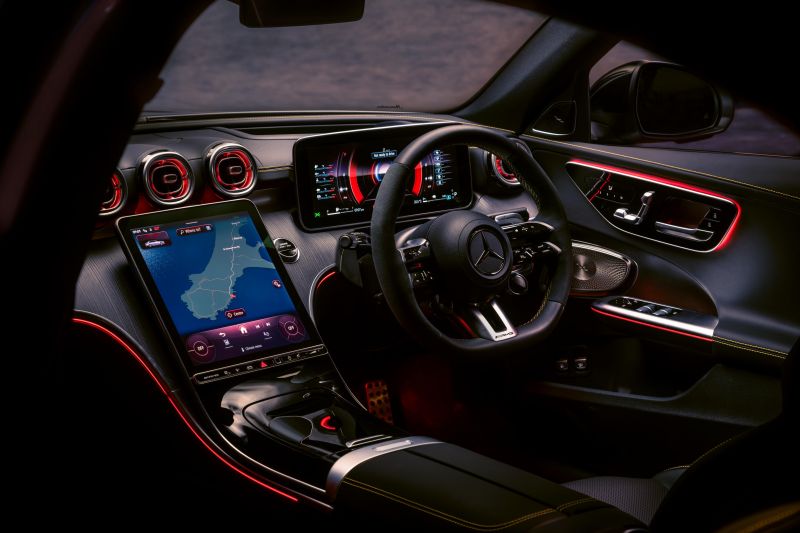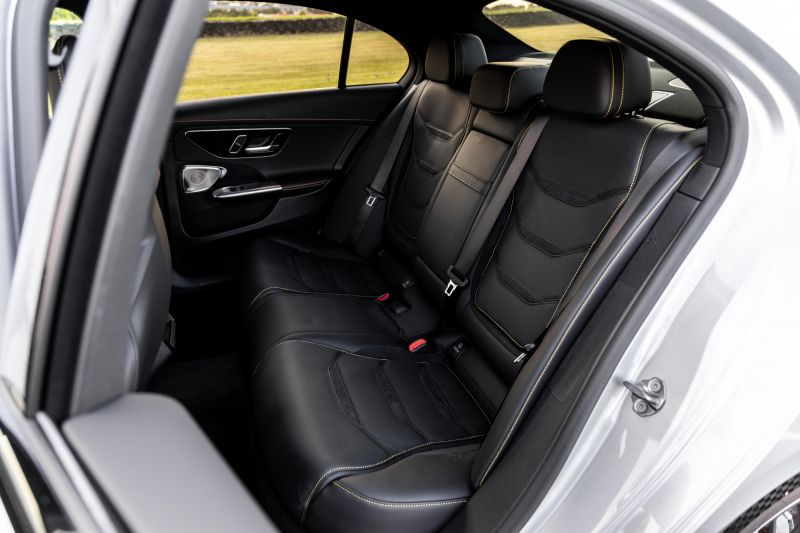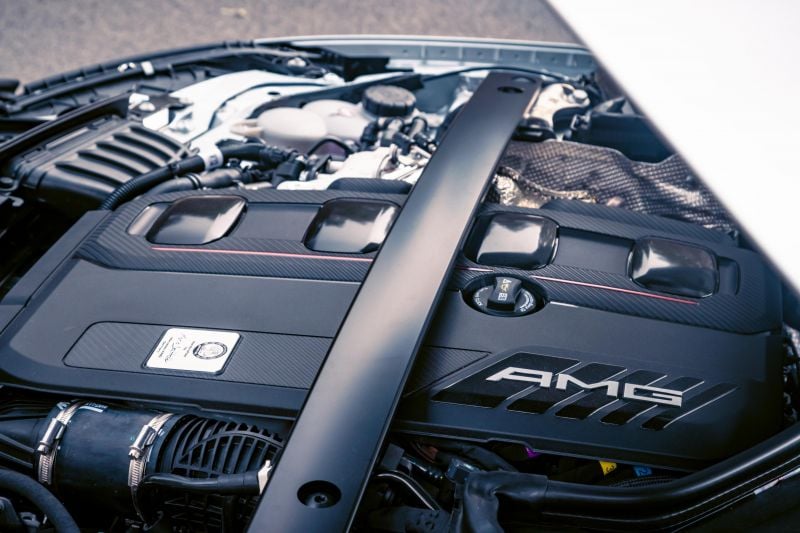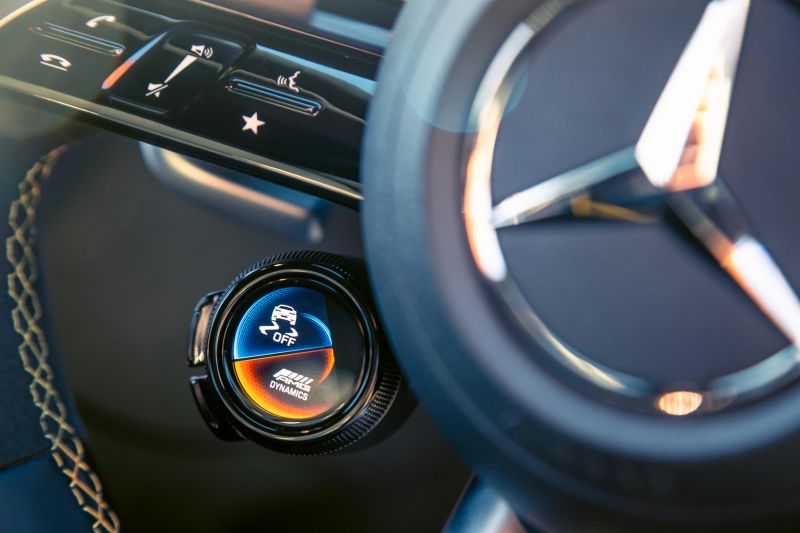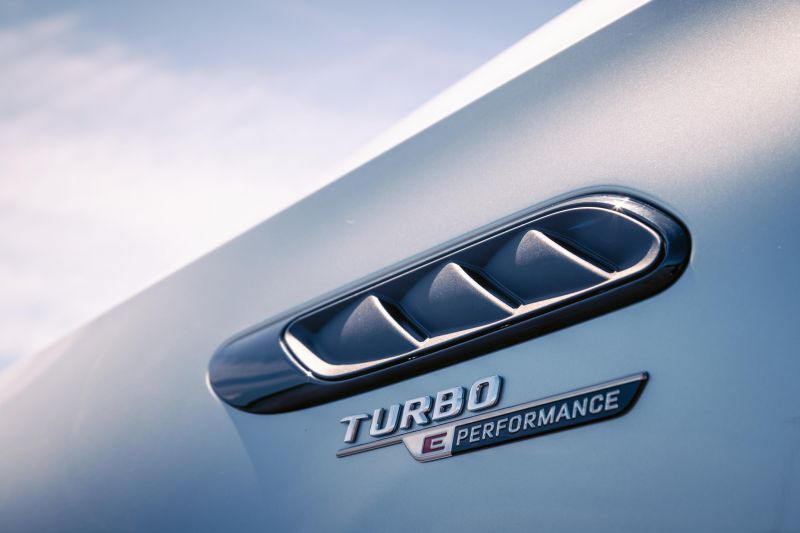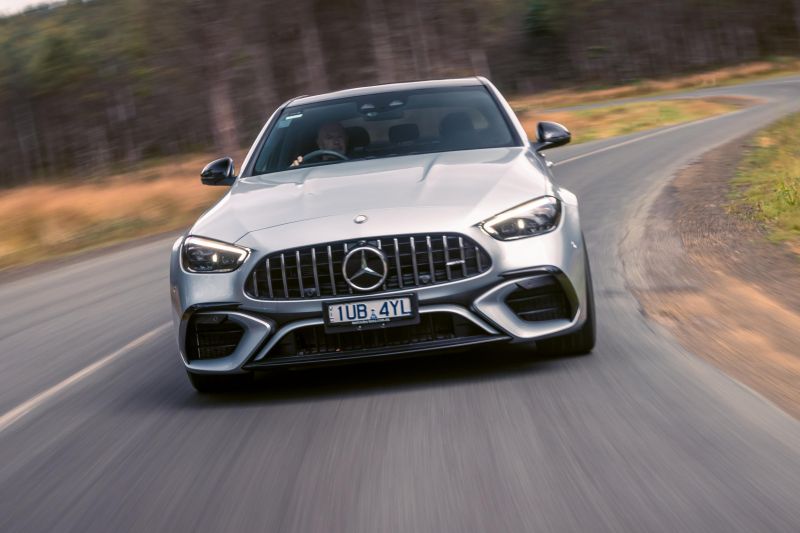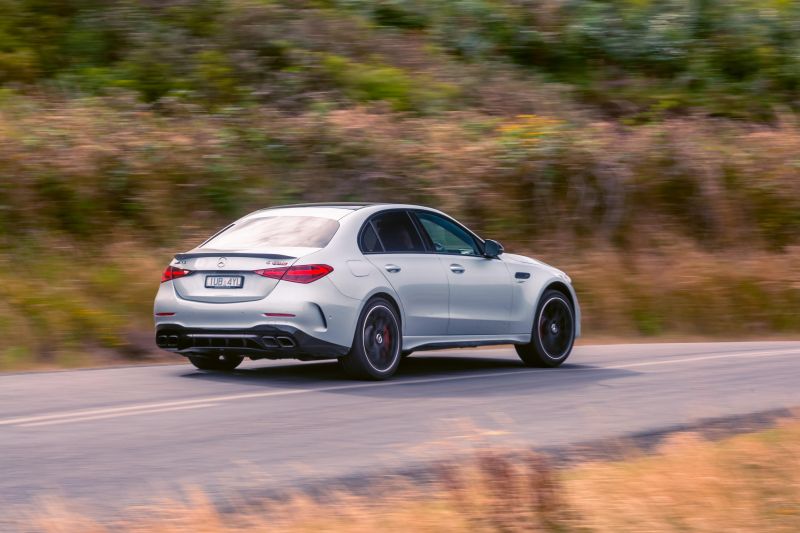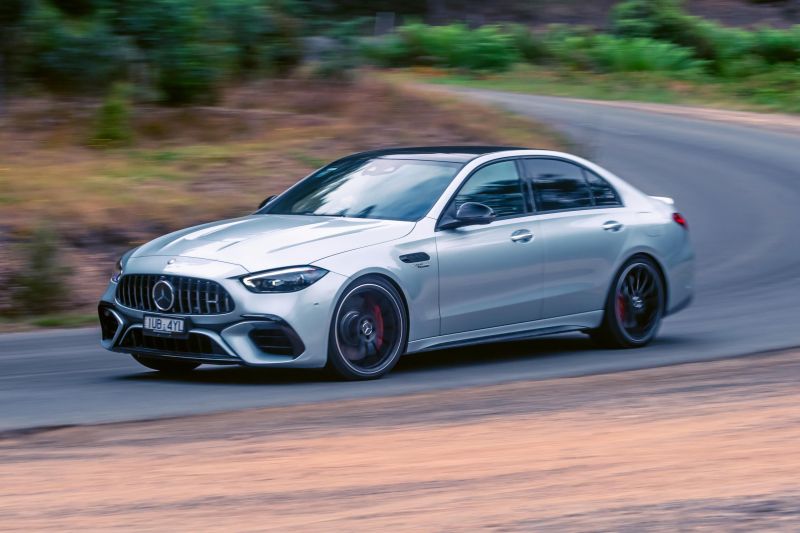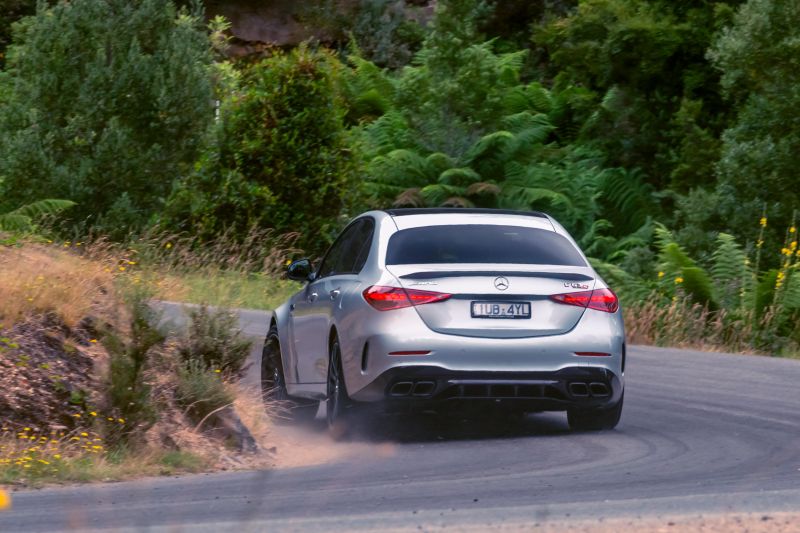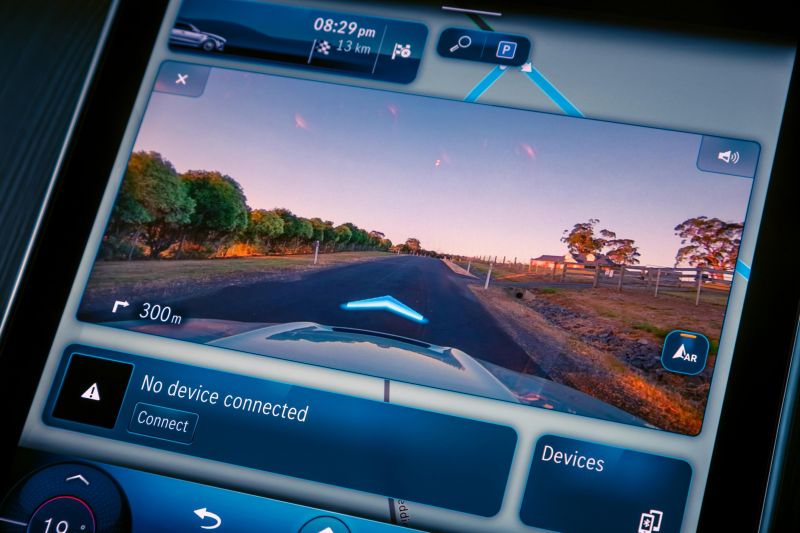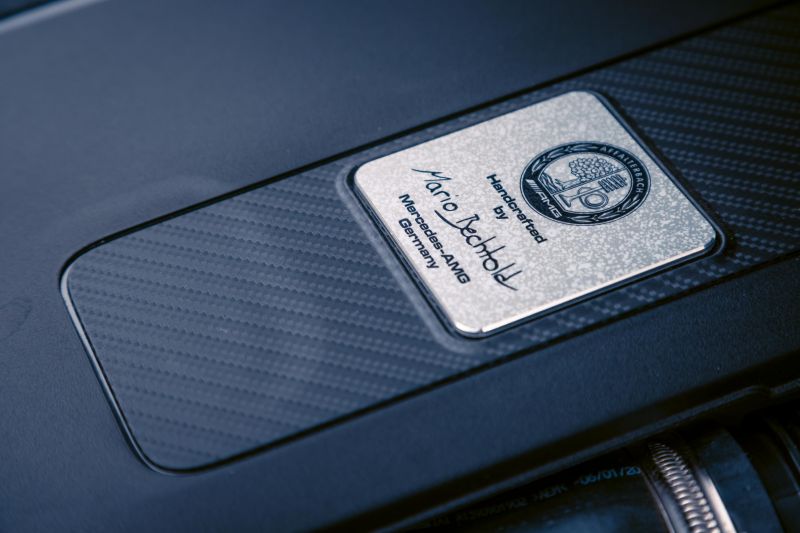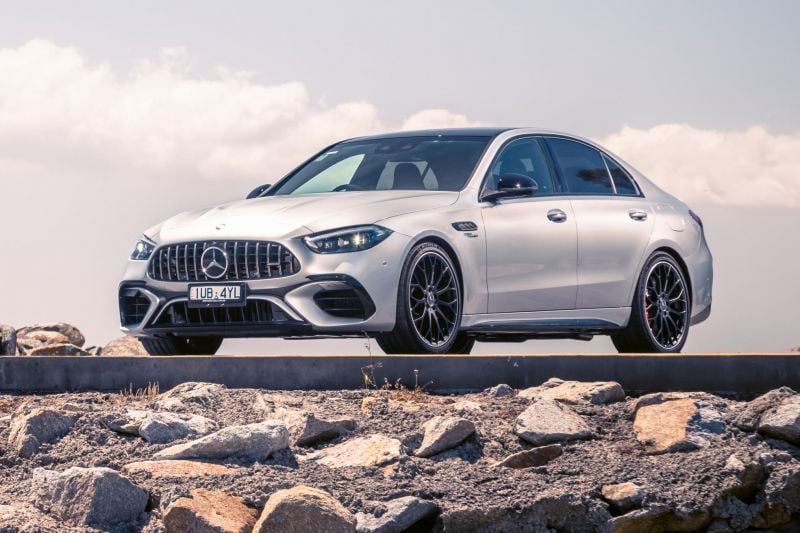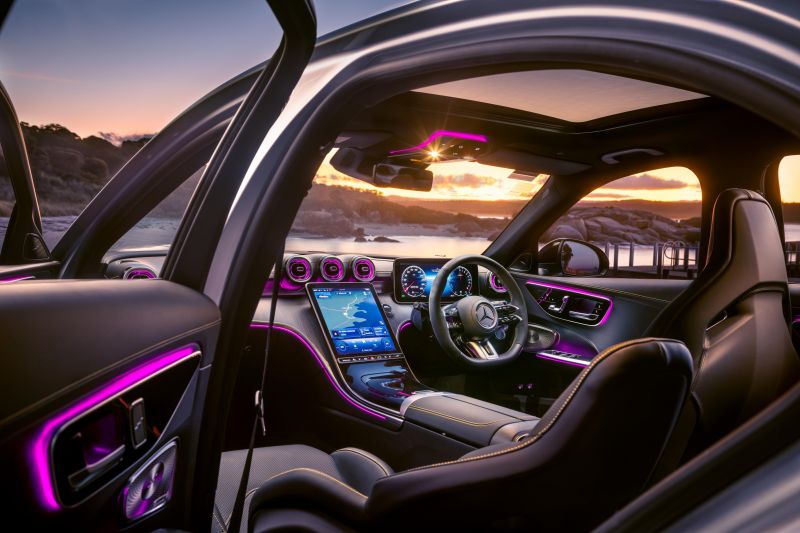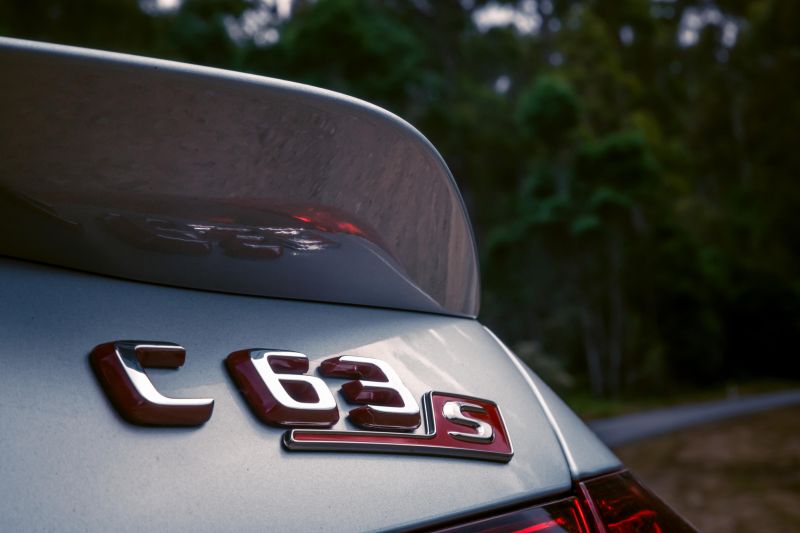You’re looking at the future of performance sedans according to Mercedes-AMG.
Having built its reputation on a diet of burbling V8 engines, Mercedes-AMG have ditched displacement in favour of a heavily turbocharged four-cylinder engine, an intricate plug-in hybrid system inspired by Formula 1, and some wild performance claims.
It’s also subbed rear-wheel drive for a sophisticated all-wheel drive system, complete with a Drift Mode that should allow you to shred enough rubber, and create enough smoke, to totally undo any emissions savings from ditching the V8.
This is a family sedan with 500kW of power, more than the outgoing AMG GT Black Series, and a whopping 1020Nm of torque. It’s been made meaningfully bigger and badder than the base C-Class; even the wheelbase has been extended by 11mm to accomodate the new powertrain.
But all that complication comes at a cost. Bigger, badder, and more powerful, the new C63 is also around 450kg heavier than the car it replaces, tipping the scales at 2133kg. That’s just 30kg less than the ill-fated Mercedes-Benz X 250d dual-cab ute.
The new 2024 Mercedes-AMG C 63 S E Performance is a fiendishly complicated car; one that’s fundamentally different to the ones that have come before.
It’s a deeply impressive car… but yes, we still miss the V8.
How does the Mercedes-AMG C fare vs its competitors?
View a detailed breakdown of the Mercedes-AMG C against similarly sized vehicles.

Mercedes-AMG
C
How much does the Mercedes-AMG C 63 S E Performance cost?
2024 Mercedes-AMG C 63 S E Performance pricing:
- 2024 Mercedes-AMG C 63 S E Performance: $187,900
Price exclude on-road costs
To see how the AMG C 63 shapes up against its rivals, build a comparison using our handy tool.
What is the Mercedes-AMG C 63 S E Performance like on the inside?
The AMG C 63 follows the same screen-heavy, button-light design as the broader C-Class range – but with plenty of racy touches in keeping with its impressive performance potential.
The optional Performance Seats are excellent, blending the firm bolstering of something like a Recaro seat with the leather trim (and electric adjustment) you’d expect of a Mercedes-Benz. They’re heated, but not cooled.
The driver grasps a fat-rimmed steering wheel with Alcantara inserts, and the dashboard is trimmed in carbon-fibre. It’s a very flashy interior thanks to its massive screens, in keeping with the regular C-Class.
The 11.9-inch vertically-oriented touchscreen is super high-resolution, and all the animations wouldn’t look out of place on an iPad or iPhone. Wireless Apple CarPlay worked flawlessly, and had none of the lag we suffered in the C 300.
MBUX is super slick, and the idea of a zero-layer system – where everything is within easy reach, rather than below multiple layers of touch menu – is well executed here. The learning curve is flatter than in the latest BMWs, and the fake climate controls are easy to use at a glance.
The driver display doesn’t deviate from what you’d expect of a Mercedes-Benz, with a clean layout and the ability to view maps on the move, while the head-up display is like having a widescreen TV floating in front of the car.
Those touch controls on the steering wheel remain needlessly complicated, and hard to use on the move. Storage up front is solid, from the configurable spot on the transmission tunnel to the big door pockets. It’s a C-Class after all.
Rear seat space isn’t all that flash, though. It’s fine, but legroom and headroom aren’t quite up with a BMW M3. There’s no wagon on offer in Australia, although the GLC 63 S E Performance SUV is coming to offer a more practical option.
ISOFIX points feature on the outboard rear seats, and there’s a trio of top tether points. You also get a fold-down central armrest, air vents, and USB chargers back there, all of which will make the kids happy on long trips.
Boot space has been hit hard by the shift to plug-in hybrid power. There’s a pronounced hump in the floor due to the battery pack and electric motor hardware, slashing boot space to 324 litres – down 130 litres on the regular C-Class.
What’s under the bonnet?
There’s a lot going on here.
The petrol engine is a version of the M139 2.0-litre four-cylinder turbo debuted in the AMG A 45 S, pumping out 350kW of power and 545Nm of torque on its own. It’s the most powerful production four-cylinder engine in the world, packing more of a punch than even the AMG A 45 thanks to a larger (71mm v 63mm) turbo compressor wheel.
That turbocharger is driven not just by exhaust gases, but by a 48V electrical system that helps it spool faster from low revs. It’s hooked up to a nine-speed AMG multi-clutch transmission (no, it’s not a dual-clutch).
Electric power comes courtesy of a rear-mounted electric motor making 150kW of power and 320Nm of torque. It’s fed by a 6.1kWh lithium-ion battery pack, good for a claimed 15km of electric-only range.
Mercedes-Benz says the PHEV battery pack weighs less than 90kg, and a real focus has been placed on cooling. That means you should be able to deploy full power (or close to it) all the time, and allows the battery to rapidly charge using the petrol engine in Sport, Sport+, or Race modes.
The electric motor has its own two-speed transmission mounted just above the rear axle… which is also home to an electrically controlled limited-slip differential.
How all those elements interact varies depending on which of the eight(!) drive modes you’re in. Comfort prioritises the e-motor, Sport, Sport+, and Race make the way the system works more focused on going fast, and less focused on saving the planet.
All of this is put to the road through a variable 4Matic+ all-wheel drive system, complete with a Drift Mode that locks out the front driveshaft so you can hang the tail out. Between all-out Drift Mode and the standard setup are four stages of stability control intervention, and a nine-stage traction control system.
The suspension is also adjustable through three drive modes, the exhaust system can be toggled through quiet and loud modes, and the nine-speed automatic can be driven in automatic or manual modes – phew.
| Model | AMG C 63 S E Performance |
|---|---|
| Engine | 2.0L 4cyl turbo petrol plug-in hybrid |
| Engine power | 350kW |
| Engine torque | 545Nm |
| E-motor power | 150kW |
| E-motor torque | 320Nm |
| Combined power | 500kW |
| Combined torque | 1020Nm |
| Kerb weight | 2133kg |
Economy:
| Model | AMG C63 S E Performance |
|---|---|
| Fuel economy (WLTP claim) | 6.9L/100km |
| Electric-only range (WLTP claim) | 15km |
| Fuel economy (observed) | 10.9L/100km (mixed/hard driving) |
| Fuel tank size | 51 litres |
| Battery size | 6.1kWh lithium-ion |
| Fuel requirement | 98 RON |
How does the Mercedes-AMG C 63 S E Performance drive?
With a heavily turbocharged engine, multiple electric motors, variable four-wheel drive and traction control, rear-wheel steering, and a list of drive modes long enough to make Lewis Hamilton nervous, there’s a lot going on here… but Mercedes-AMG has done an amazing job making it all fit together. It’s incredibly cohesive.
Cruising out of our hotel in Comfort Mode, there’s no input from the petrol engine. It starts silently, and accelerates briskly up to around 80km/h without waking the turbocharged 2.0-litre – although it’s never more than brisk with the e-motor doing the heavy lifting.
Ask for the full C 63 experience and the engine bursts to life with a bark. It all happens smoothly though, without the awkward handover feeling you get in some plug-in hybrids.
And it’s sneaky fast, even in Comfort. This engine feels heavily boosted in the A 45, with a noticeable pause between burying the throttle and boost building. Here, there’s an electric hand of god silently shoving the C 63 forward where that gap used to be, and the turbocharger spools even faster thanks to the clever electric compressor technology.
It’s all so smoothly tied together though and you don’t realise just how quickly you’re going. That’s not something you can say about the PHEV system in a BMW XM, for example.
What it does lack is noise compared to the last AMG C 63, especially when you’re just cruising around town.
The motorsports bark from the four-cylinder isn’t a bad noise, and the ignition cut sounds vicious on full throttle upshifts – but it doesn’t come close to matching the bombastic 4.0-litre that came before it for drama.
Show them both a set of corners and the old car wouldn’t see where the new one went, though. It’s so damn capable.
Set up with the powertrain in Race, the AMG Dynamics suite in Pro, the suspension in Sport, the exhaust in loud, and the transmission in manual (phew), it demolishes Australian backroads.
Just to reiterate, it’s wickedly fast in a straight line, with what feels like unbroken thrust carrying you from standstill to highway speeds in the blink of an eye.
And then you get to a corner and the brakes have enough stopping power to haul this 2200kg beast into line without breaking a sweat, the front end darts determinedly where you point it, and the all-wheel drive system lets you get on the power sooner and with more confidence than was ever the case in the rear-wheel drive V8.
Rather than trying to step sideways and bite you when you chase the throttle, the clever all-wheel drive system and suite of driver assists are always working to keep up to 500kW and 1020Nm in check… without getting in the way.
Based on our road drive, they tend to get it right. It’s an incredibly approachable car, which will exit corners with what feels like a hint of oversteer when you mat the throttle without ever feeling like it’ll bite you.
It’s like a more powerful, more sophisticated take on the already clever 4Matic system in the A 45. It’s remarkably capable, but it’s also a very different experience to before.
And then, when you’re done imitating George Russell, it settles into life as a commuter better than any C 63 before it. The previous-generation car in particular was always firm on pockmarked roads, like it was trying to pummel the surface into submission.
The new one was genuinely comfortable on some pretty rough-and-ready roads, although the softer setup can make the C 63 feel heavy over highway crests and dips. It’s a common PHEV pitfall, and one AMG has managed to sidestep in most scenarios.
Flicking the suspension into Sport tightens it up nicely without ruining the ride entirely.
The biggest knock on refinement is road noise; a common complaint with Mercedes-AMG cars caused by Australia’s coarse-chip rural highways, and the massive, sticky Michelin tyres becoming the norm on German super sedans and hatches.
It can be drowned out by cranking up the Burmester sound system, but it’s a knock on the car’s luxury bona fides.
What do you get?
C 63 S E Performance highlights:
- Rear-axle steering
- Drift Mode
- AMG high-performance composite brake system
- 6-piston fixed front calipers
- 1-piston floating rear calipers
- Digital Light headlights with adaptive high-beam
- Panoramic sunroof
- 11.9-inch touchscreen infotainment system
- Android Auto and Apple CarPlay
- Satellite navigation with augmented reality
- 12.3-inch digital instrument cluster
- Head-up display
- Burmester 3D surround sound system
- Wireless phone charger
- Ambient lighting
- AMG Track Pace package
- Power-adjustable front AMG sport seats
- Heated front seats
Is the Mercedes-AMG C 63 S E Performance safe?
The Mercedes-AMG C 63 S E Performance isn’t included under the new C-Class’s five-star ANCAP safety rating, and is therefore unrated.
Standard safety equipment includes:
- Adaptive cruise control with stop/go
- Autonomous emergency braking
- Pedestrian/cyclist detection
- Junction assist
- Blind-spot monitoring
- Lane keep assist
- Traffic sign recognition
- Safe exit warning
- Surround-view camera
- Semi-automatic parking assist
- 10 airbags
How much does the Mercedes-AMG C 63 S E Performance cost to run?
Mercedes-Benz backs its cars with a five-year, unlimited-kilometre warranty.
The lithium-ion battery pack has a six-year, 100,000km warranty in line with other Mercedes-Benz plug-in hybrids.
Maintenance is required every 12 months or 20,000km, and a five-year service plan will set you back $7080.
CarExpert’s Take on the Mercedes-AMG C 63 S E Performance
The new AMG C 63 S E Performance is deeply impressive.
The new plug-in hybrid powertrain is complicated, but the way it’s been executed is incredibly cohesive. You’re aware there’s a lot going on, but it mostly happens in the background.
All you get is staggering performance, and the clever all-wheel drive system means you can actually put it to the ground in a way that has never been possible in a C 63.
Throw in a more comfortable ride, the meaningfully more modern interior, and the fact it’s not nearly as expensive as we’d expected, and it’s hard to argue with the fact Mercedes-AMG has delivered on what it set out to do.
But… the last C 63 S wasn’t necessarily a better car than an M3 or an Alfa Romeo Giulia Quadrifoglio on the track. The ride was firm in town, the cabin was getting old, and it drank like a sailor on shore leave.
It was objectively worse than the new car, but it put a massive smile on your face every time you prodded the start button and that grumbly V8 engine burst into life.
You see so many crawling along Chapel Street after dark because they look and sound good, not because there’s a hyper modern, Formula 1 inspired plug-in hybrid powertrain under the bonnet.
Will the new one make you feel special away from the high-speed Tasmanian roads we drove? I’m not so sure. It’s going to be fun finding out, though.
Click the images for the full gallery
BUY: Mercedes-AMG C-Class
MORE: Everything Mercedes-AMG C-Class

